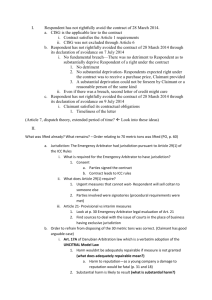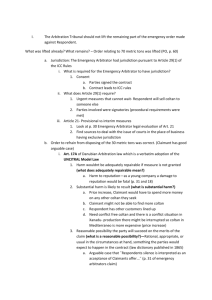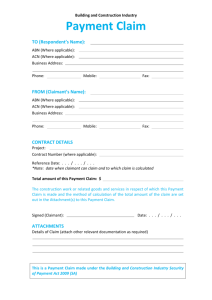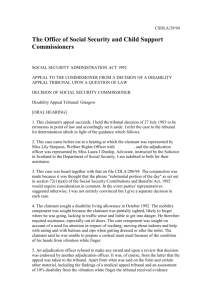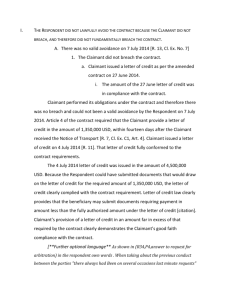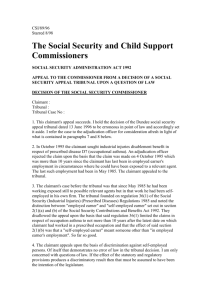Argument Outline- Day 1
advertisement
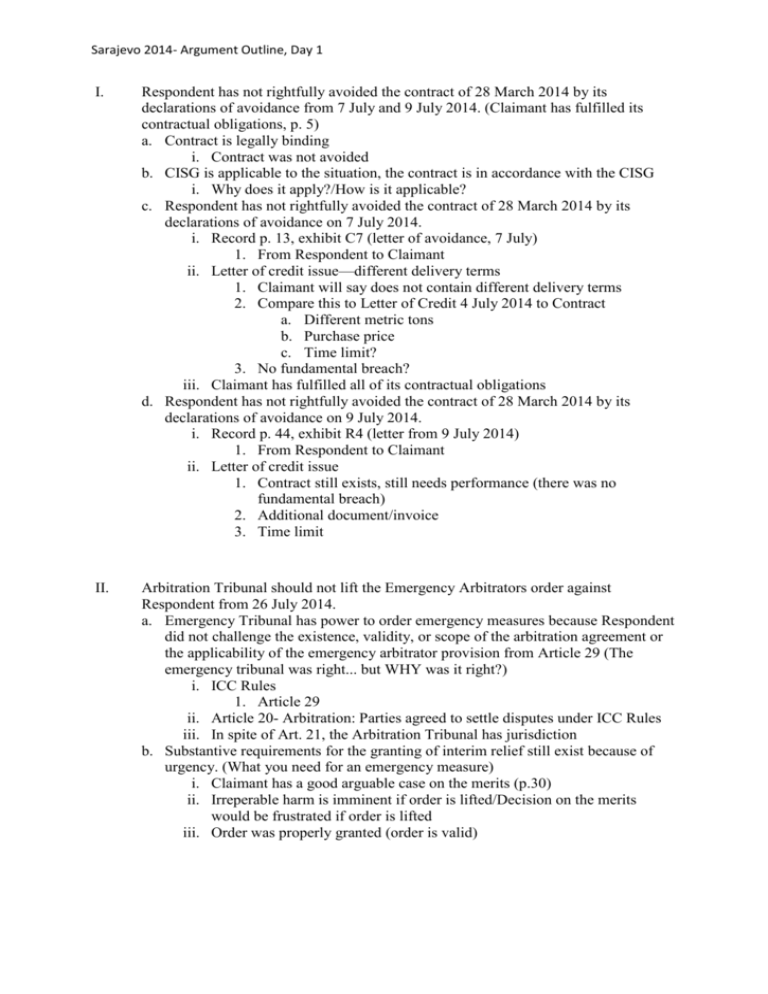
Sarajevo 2014- Argument Outline, Day 1 I. Respondent has not rightfully avoided the contract of 28 March 2014 by its declarations of avoidance from 7 July and 9 July 2014. (Claimant has fulfilled its contractual obligations, p. 5) a. Contract is legally binding i. Contract was not avoided b. CISG is applicable to the situation, the contract is in accordance with the CISG i. Why does it apply?/How is it applicable? c. Respondent has not rightfully avoided the contract of 28 March 2014 by its declarations of avoidance on 7 July 2014. i. Record p. 13, exhibit C7 (letter of avoidance, 7 July) 1. From Respondent to Claimant ii. Letter of credit issue—different delivery terms 1. Claimant will say does not contain different delivery terms 2. Compare this to Letter of Credit 4 July 2014 to Contract a. Different metric tons b. Purchase price c. Time limit? 3. No fundamental breach? iii. Claimant has fulfilled all of its contractual obligations d. Respondent has not rightfully avoided the contract of 28 March 2014 by its declarations of avoidance on 9 July 2014. i. Record p. 44, exhibit R4 (letter from 9 July 2014) 1. From Respondent to Claimant ii. Letter of credit issue 1. Contract still exists, still needs performance (there was no fundamental breach) 2. Additional document/invoice 3. Time limit II. Arbitration Tribunal should not lift the Emergency Arbitrators order against Respondent from 26 July 2014. a. Emergency Tribunal has power to order emergency measures because Respondent did not challenge the existence, validity, or scope of the arbitration agreement or the applicability of the emergency arbitrator provision from Article 29 (The emergency tribunal was right... but WHY was it right?) i. ICC Rules 1. Article 29 ii. Article 20- Arbitration: Parties agreed to settle disputes under ICC Rules iii. In spite of Art. 21, the Arbitration Tribunal has jurisdiction b. Substantive requirements for the granting of interim relief still exist because of urgency. (What you need for an emergency measure) i. Claimant has a good arguable case on the merits (p.30) ii. Irreperable harm is imminent if order is lifted/Decision on the merits would be frustrated if order is lifted iii. Order was properly granted (order is valid) Sarajevo 2014- Argument Outline, Day 1 III. Jurisdiction/Joinder—The Arbitral Tribunal does not have jurisdiction over Global Minerals. a. Global Minerals is not a party to the contract b. What does a tribunal need to have jurisdiction? i. Once you know what a tribunal needs, show that the Tribunal does not have those elements ii. Look to procedural rules iii. Agreement iv. Need to show Tribunal does not have jurisdiction c. How do you show who is a party to the contract? How do you bring in thrid parties to the contract? (How do you prove Global Minerals is not a party to the contract?) (Remember to look to the legal evaluation for Claimant and Respondent to help evaluate the issues in the Procedural Order. Also remember to look at the example outline (tab 10) to help see how you should structure the outline.) What is the law? How do we (Claimant) satisfy the law? Why does that mean Respondents arguments fail?
